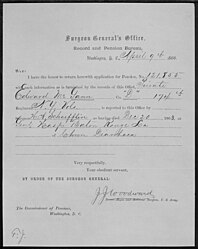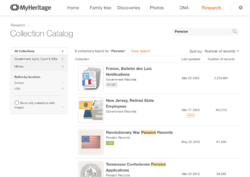
A pension is a regular payment made to a person and/or their dependents by a government or a business. Traditionally, this payment is a retirement benefit or a disability payment due to work or military service. However, it can be a government payment for other reasons.
For example, in the United States in the early 20th century, some states provided single and widowed mothers with a "Mothers Pension." This regular payment was paid to help women care for their children in the absence of a husband or the children's father.
In some countries, citizens who reach a certain age might receive an "old age pension." This is in the form of Social Security payments in the United States.
Information found in pension records
At the very least, a pension record can provide proof of an ancestor in a specific time and place. No matter the type of pension record, genealogically relevant information can include the following:
- Name
- Residence
- Age and/or birth date
- Death date
- Type of Benefit
Pension files for an occupation or military service can include much more, such as:
- The name of dependents (spouse and/or children)
- Details about service (work or military)
- The qualifications for the pension
- Medical conditions
Clues to a pension

An occupational pension is a 20th-century record, though people receiving a pension in the earlier 20th century were born in the mid to late 19th century. Military pensions date to much earlier.
As you research your ancestor, consider their occupation and military service. Did they work for a large company? Learn more about the history of that company and any benefits to long-term employment. Not everyone who worked, even for a large company, may have received a pension or benefits.
If your ancestor served in the military, especially during wartime, read more about possible pensions that might have been awarded to them or their family. Sometimes, the pension might be due to a disability or death. Not everyone who served received a pension, so reading more about the time period, military action, and pensions can help determine if your ancestral family received one. Genealogically relevant information can be found in files even if the service member or family applied for a pension but were not eligible.
Clues to employment that may lead you to pension records can be found in a census, death certificate, or newspaper articles. Clues to a military pension may be found in a military record or census.
In the 20th century, old age pensions were paid out by various country governments. This regular payment helped the elderly or disabled (or their dependents) survive. Further research will help determine when these payments started for the country you are researching and who received them.
Where to find pensions

Conducting a subject search using the keyword “pension” in the MyHeritage Collections Catalog provides a list of databases for pensions. Also, search for military, employment, or other occupational records. Keep in mind that these records are always evolving, and new databases are added over time. Include research about the war, location, or company to learn more about possible pension records and where to find them.
If the country you are researching paid out an old age pension, such as Social Security in the United States, search for indexes and databases online. Additional records must be ordered from the appropriate government agency and can be worthwhile. Further information can include parents' names, birth dates, and occupations. Information from the time of payment of the benefit can consist of the residential address and death date or final benefit date.
Not all pension records will be extant or available. Military pensions must be acquired by the country entity that archives military records, such as the National Archives in the United States. Depending on the age of the file, it may not be available to the public for privacy reasons.
If the pension is due to occupation, you will need to ascertain whether the records are available to the public for genealogical research and, if so, where to acquire them and how much they cost.
Research pension records on MyHeritage
Explore more about pension records
- US Social Security Applications and Claims, 1936-2007 at MyHeritage
- US Social Security Death Index (SSDI) at MyHeritage
- US Railroad Retirement Board Records at National Archives
- How to look for records of Disability and dependents’ pensions in the First World War at National Archives (UK)
- United States Military Pension Records at FamilySearch Research Wiki